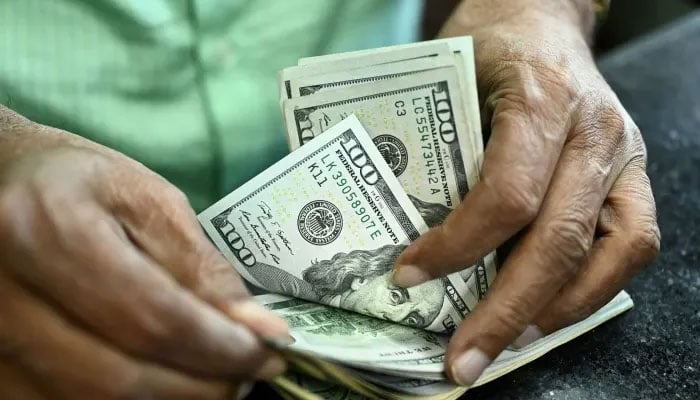Government plans Rs4.965 trillion bank borrowing in April-June
From April through June, the majority of the borrowing is expected to be done via fixed and floating rate
KARACHI: The government is set to borrow Rs4.965 trillion from banks between April and June 2024, primarily through the sale of treasury bills and bonds, to plug its budget deficit.
From April through June, the majority of the borrowing is expected to be done via fixed and floating rate Pakistan Investment Bonds (PIBs) that have maturities of three, five, 10, 15, 20, and 30 years.
The government plans to raise Rs2.490 trillion through long-term paper auctions, according to the central bank's auction calendar, which was released on Friday.The government will borrow Rs2.475 trillion from commercial banks through the auctions of market treasury bills.
The government’s increasing spending requirements force it to borrow money from banks.Pakistan’s public debt increased by 6.51 percent to Rs64.805 trillion in the first eight months of the fiscal year 2023–24, according to the latest figures from the State Bank of Pakistan (SBP).
In February, there was a 19 percent year-on-year growth in the federal government debt.Between July and February of FY2024, the central government's domestic debt increased by 10 percent to Rs42.671 trillion. The debt increased by 24.9 percent year-on-year in February.
The public debt has increased as a result of the government's expanding financial requirements and limited external financing. The government's increasing reliance on domestic resources to fund its budget deficit, in the face of rising interest rates, is reflected in the rise in markup payments, particularly on domestic debt.
Due to high interest rates, declining revenues for state-owned enterprises, and inadequate tax collection, the government is finding it increasingly difficult to pay off the nation's debt.Currently, the SBP’s benchmark interest rate is at 22 percent.
Analysts expect the SBP to start monetary easing in the second quarter of this year. Although the recent surge in fuel prices has caused fears, inflation is expected to decline in the coming months due to a significant high base effect.As a result, there is growing anticipation that rates may be lowered during the upcoming monetary policy review on April 29.
-
 Winter Olympics 2026: Top Contenders Poised To Win Gold In Women’s Figure Skating
Winter Olympics 2026: Top Contenders Poised To Win Gold In Women’s Figure Skating -
 Inside The Moment King Charles Put Prince William In His Place For Speaking Against Andrew
Inside The Moment King Charles Put Prince William In His Place For Speaking Against Andrew -
 Will AI Take Your Job After Graduation? Here’s What Research Really Says
Will AI Take Your Job After Graduation? Here’s What Research Really Says -
 California Cop Accused Of Using Bogus 911 Calls To Reach Ex-partner
California Cop Accused Of Using Bogus 911 Calls To Reach Ex-partner -
 AI Film School Trains Hollywood's Next Generation Of Filmmakers
AI Film School Trains Hollywood's Next Generation Of Filmmakers -
 Royal Expert Claims Meghan Markle Is 'running Out Of Friends'
Royal Expert Claims Meghan Markle Is 'running Out Of Friends' -
 Bruno Mars' Valentine's Day Surprise Labelled 'classy Promo Move'
Bruno Mars' Valentine's Day Surprise Labelled 'classy Promo Move' -
 Ed Sheeran Shares His Trick Of Turning Bad Memories Into Happy Ones
Ed Sheeran Shares His Trick Of Turning Bad Memories Into Happy Ones -
 Teyana Taylor Reflects On Her Friendship With Julia Roberts
Teyana Taylor Reflects On Her Friendship With Julia Roberts -
 Bright Green Comet C/2024 E1 Nears Closest Approach Before Leaving Solar System
Bright Green Comet C/2024 E1 Nears Closest Approach Before Leaving Solar System -
 Meghan Markle Warns Prince Harry As Royal Family Lands In 'biggest Crises' Since Death Of Princess Diana
Meghan Markle Warns Prince Harry As Royal Family Lands In 'biggest Crises' Since Death Of Princess Diana -
 Elon Musk Weighs Parenthood Against AI Boom, Sparking Public Debate
Elon Musk Weighs Parenthood Against AI Boom, Sparking Public Debate -
 'Elderly' Nanny Arrested By ICE Outside Employer's Home, Freed After Judge's Order
'Elderly' Nanny Arrested By ICE Outside Employer's Home, Freed After Judge's Order -
 Keke Palmer On Managing Growing Career With 2-year-old Son: 'It's A Lot'
Keke Palmer On Managing Growing Career With 2-year-old Son: 'It's A Lot' -
 Key Details From Germany's Multimillion-euro Heist Revealed
Key Details From Germany's Multimillion-euro Heist Revealed -
 David E. Kelley Breaks Vow To Cast Wife Michelle Pfeiffer In 'Margo's Got Money Troubles'
David E. Kelley Breaks Vow To Cast Wife Michelle Pfeiffer In 'Margo's Got Money Troubles'




